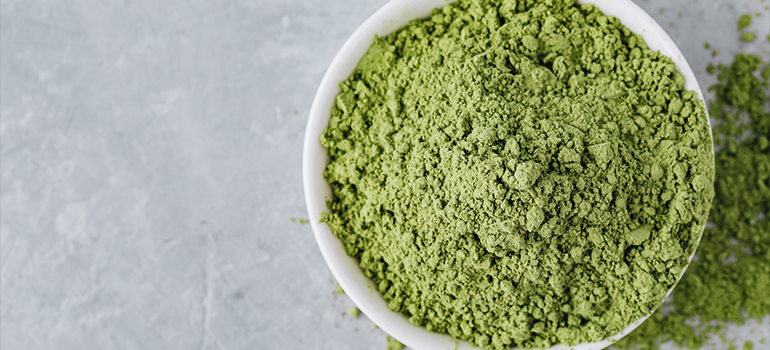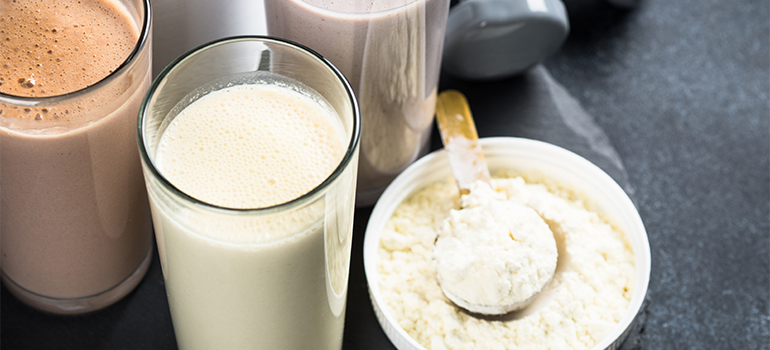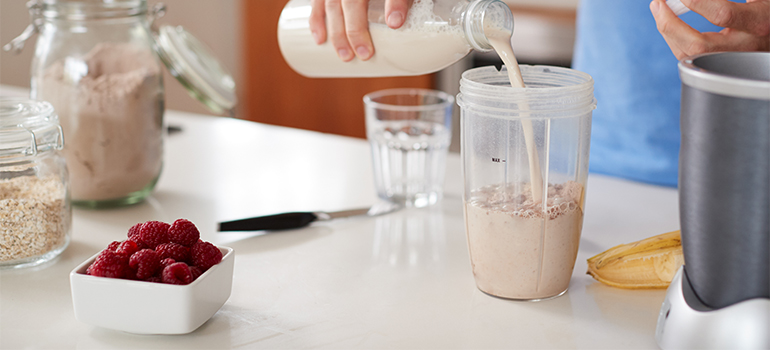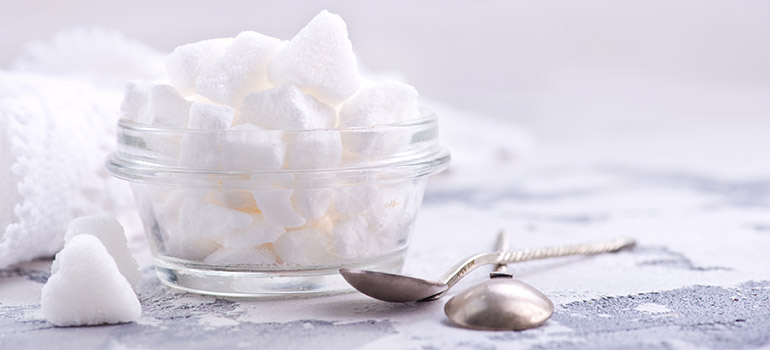Together, protein powders and muscle recovery supplements support the health of your muscles as you lose weight.

You drink your protein powder shakes and muscle recovery supplements, but have you ever wondered what the difference is?
In fact, what are the actual benefits of them?
When all you want to do is build lean muscles, reduce muscle soreness, and lose weight, should you need to care about protein delivery, muscle protein synthesis, or knowing what replenish glycogen stores mean?
Well, yes. I believe that you should.
What you probably already know about protein powders and post-workout supplements

Commonly, people use protein powder and muscle recovery supplements but don’t know why.
Perhaps you have people telling you should drink protein powder and a muscle recovery supplement. Yet, no one seems to tell you why it’s important.
Or maybe you’re like me, wondering what that pink or blue liquid some were drinking from shaker bottles. For years I thought people were drinking Kool-Aid at the gym.
Maybe some were. One can hope.
In reality, most of them were probably drinking muscle recovery supplements.
And if you’ve ever seen people leaving the gym, shaking a bottle vigorously, it’s most likely a protein shake.
Great! But that still doesn’t answer the question of why? Or what’s the difference between protein powder and muscle recovery supplements?
Well, doesn’t protein help build lean muscles? And doesn’t muscle recovery supplements reduce muscle soreness post-workout?
Yes! Protein shakes, and post-workout supplements do help with muscle development and muscle fatigue.
But there is so much more to it!
Do you know what else protein powders do? Do you know why carbs are an essential part of protein powder?
Do you know what glycogen stores are? Or about muscle protein synthesis and its role in weight loss and fitness?
Not sure what I’m talking about when I ask?
That’s alright because there is no time like the present to find out!
First, the basics-
How are protein powders and muscle recovery supplements different?

- Powder or Pre-mixed Drinks vs. Powders or Capsules/Pills
- Complete Protein vs. Specific Aminos
- Protein, Vitamins, and Minerals vs. Protein Delivery Nutrients, and Protein Synthesis Ingredients
- Number of Ingredients
- Number of Calories
1. Protein shakes are pre-mixed or powders, while muscle recovery supplements can be pre-mixed, powders, capsules, or pills.
Most protein powder shakes are either pre-mixed and refrigerated or powders to mix and make on your own. There are single-purpose protein powders and protein powders that serve as a complete meal replacement.
So whether you’re looking for the best meal replacement powder for women or just a good tasting protein powder, the decision comes down to personal preference!
There is also an array of flavors out there! So chances are, you can find something that will also help satisfy any sweet cravings.
As for muscle recovery supplements, they are available in three forms. You can purchase muscle recovery pills, capsules, or post-workout supplement powders to mix yourself.
Once again, there is a vast array of options for flavors. So chances are, you can find one you’ll love.
At most gyms, you can find muscle recovery supplements pre-mixed and ready to drink in their refrigerated section. These choices are a great option if you want to try a variety of flavors before buying your own.
2. Protein powders can be complete protein supplements, while post-workout supplements are specific amino or simple compounds.
Whey protein powders usually offer a complete source of protein. In particular, meal replacement protein powders are more filling, providing complete nutrition across the board.
Regardless, all protein powders should supply ample grams of protein. Protein powders can also be taken at any time of day to help meet daily intake goals.
Muscle recovery supplements typically have simpler ingredients than protein powders and should be consumed during or after a workout. The best supplements for muscle recovery should contain simple amino acids that assist in post-workout soreness.
You can take a recovery supplement after workouts, before, or even during your workout.
3. Protein shakes contain protein, vitamins, and minerals, whereas muscle recovery supplements contain protein delivery ingredients and protein synthesis nutrients.
Think about it this way, complete-protein powders provide everything your body needs for protein delivery and synthesis. Ideally, protein powder ingredients should include vitamins, minerals, protein, and carbs.
Whereas, muscle recovery supplements provide simpler compounds, meaning that the amino acids make their way into your muscles quicker. This means your sore muscle recovery is faster.
You can almost think of muscle recovery supplements as muscle repair supplements. Muscle recovery supplements contain simple amino acids that enable the supplements to help repair muscles and reduce soreness.
4. The number of ingredients found in a protein powder is typically more than the number of ingredients found in a muscle recovery supplement.
A protein shake contains more ingredients because of its more complex construction, necessary to assist in muscle development. In comparison, a muscle recovery supplement is to help your body deliver protein to your muscles and improve your muscles with protein synthesis.
In today’s world, gluten allergies are much more common than they were twenty years ago. If you are looking for a gluten-free protein powder, the good news is that most whey protein powders are made without gluten ingredients.
Most muscle recovery supplements are typically gluten-free as well. Nevertheless, I always encourage you to check the labels to be sure.
5. Protein powders are typically more calorie-dense than muscle recovery supplements.
Overall, protein shakes tend to contain more calories because they offer more all-around optimum nutrition.
And while whey protein powder remains the most popular, a variety of options exist. You can now choose a gluten-free protein powder, dairy-free, and even a soy-free protein shake.
Meal replacement protein powders are higher in calories than regular protein powder. While this may seem off-putting, you must remember that you’re replacing a whole meal with a shake.
Meal replacement shakes come loaded with more required vitamins, minerals, fats, carbs, and protein.
Most post-workout muscle recovery supplements are lower in calories because they are not intended for full nutrition. Recovery supplements have a more straightforward job than protein powders resulting in fewer ingredients overall and, as a result, fewer calories per serving.
What is the Purpose of Protein Powder?
Both muscle recovery supplements and protein powders have diverse uses beyond what most people are aware of.
There is more to protein than just building lean muscle. And there is more to muscle recovery supplements than just preventing sore muscles.
But first, let’s just talk about protein.
There is a wide variety of supplemental protein on the market.
From milk-based whey, whey isolate/concentrate, and casein. Then you have those that are plant-based such as soy, pea, rice, and hemp proteins.
But we’re going to focus on whey protein, which is the protein source in our LadyBoss LEAN ®. It is also the most widely researched protein out there!
Did you know that whey is considered the “gold standard” in protein? Along with being the most widely researched, it has the highest absorption rate.
What does that mean? Simply that the body gets the nutrients that your muscles need from the protein powder faster.
The key to any good protein powder is balance. It must contain all essential amino acids and, dare I say, carbs.
Yes, carbs!
Carbs are what I call “the key to the muscles.” Without carbs in your protein powder, you can’t open the door to your muscles.
To help muscles grow and recover post-workout, carbs assist in getting the necessary small quantities of non-essential and conditionally-essential amino acids to your muscles.
That is why it is essential to look for a more complete, well-balanced, protein powder.
Complete, well-balanced protein powders, such as LEAN ®, have the carbs built right in so that those amino acids can go right to work in helping make that lean muscle.
Have you ever heard of “the power hour”?
The “power hour” is a popular gym myth. It’s the belief that to get the most benefits of protein, you must consume it within an hour after your workout.
While drinking your protein shake sooner than later may have some benefits, it is not essential to do so. More than anything, if you drink your protein post-workout, you just won’t feel as depleted.
There is no need to get caught up in when you take your protein, just as long as you are taking it. It is more important that you are getting enough protein to meet your daily requirements.
For one reason or another, women tend to struggle with meeting their daily recommended protein. It should be your aim to achieve that daily intake goal throughout the day, especially if you exercise regularly.
Meal replacement proteins such as LEAN ® are excellent options for helping to meet those daily requirements.
What is a meal replacement shake?
I know I’ve discussed meal replacement shakes prior, but let’s dig in further.
As I mentioned, a meal replacement shake tends to have more calories than traditional protein powder. A protein meal replacement shake is meant to be more filling and helps to maintain healthy eating.
However, even though meal replacement shakes are higher in calories, they tend to be lower than most regular meals. Therefore, by consuming fewer calories overall, meal replacement shakes aid in weight loss.
Meal replacement shakes also provide convenience for those with a busy schedule. It is an on-the-go, ready to drink meal that only requires water or milk.
What I like to do if I have a busy morning the next day is to pre-make my shake. I’ll prepare it the night before, then put it in the refrigerator, ready for in the morning.
Another great thing about meal replacement supplements is that you can eat them any time of day. Have one for breakfast, mid-morning snack, lunch, or a late-night snack.
What Is The Point of Muscle Recovery Supplements?
I hear a lot: If protein shakes and muscle recovery supplements have BCAAs, should I take both?
Yes, you should because there is a difference between them, even if they seem similar. The difference is all about the chemical structure.
But don’t worry, you don’t need to be a science-whiz to know how to put your supplements to work.
The common idea behind taking a muscle recovery supplement, like LadyBoss RECOVER ®, is to help reduce muscle pain post-workout. Muscle recovery supplements do stimulate muscle recovery after exercise, but they have many other diverse purposes.

For starters, muscle recovery supplements can increase endurance during exercise! And who doesn’t want to perform better at the gym?
Typically, with a muscle recovery supplement, you drink it within 30 minutes following a workout. However, you might actually gain more muscle-building benefits if you drink your post-workout supplement during your workout.
Now you can be the person drinking the mysterious pink or blue liquid in the gym! And somewhere out there is someone who will think you’re drinking Kool-Aid.
You’ve come a long way. But I digress.
BCAAs in muscle recovery supplements are what help increase strength output during exercise. Basically, they get the blood pumping!
BCAAs also assist in muscle growth, as well as in weight loss, and aid in reducing muscle soreness. For something we refer to as a “simple compound,” they do a lot!
Now, you’ve probably heard of people just drinking juices or something similar as a post-workout supplement. The reason people drink juice as a post-workout drink is because of the simple sugars found in them.
In fact, a large percentage of the fitness community drink (many people drink) chocolate milk for a recovery drink (but carbs in chocolate milk are simple sugars, not complex carbs). Simple sugars can be easily broken down in the body and converted into useful energy, supporting increased output.
However, beverages like chocolate milk do not offer much beyond the energy boost from the simple sugars. You lack the essential amino acids to help with muscle protein synthesis.
The same goes for other popular post-workout juices like apple juice, orange juice, and the likes thereof.
Some people also believe that drinking coffee during or after a workout provides benefits.
Look, I love coffee as much as anyone, but the only thing it’ll provide for a workout is energy. Sure, it can give you caffeine for your workout, but you need more than that!
Coffee also dehydrates you, even if you don’t realize it at first. Becoming dehydrated during a workout can lead to reduced performance and cramps.
No one wants to be running on the treadmill, deep in the runner zone and struck suddenly with a leg cramp. So it’s best to avoid coffee as a muscle recovery supplement beverage.
That’s not to say you can’t drink coffee, just do it an hour before or after your workout.
(PRO TIP: LadyBoss RECOVER ® can be combined with LadyBoss FUEL ®, our premium pre-workout drink for women, and consumed during exercise. Both all-star workout supplements are flavored the same so that you can capitalize on increased muscular energy and endurance during physical activity.)
We do love our BCAAs and all they do for us. But there is so much more to it than just BCAAs!
Just as a good protein shake requires balance, an excellent muscle recovery supplement needs essential ingredients. You want your muscle recovery supplement to support your efforts.
The ingredients in your muscle recovery supplement need to help you get the most from your fitness efforts. You’re working hard, why shouldn’t your muscle recovery supplement?
For a long time, I heard people talk about BCAAs, amino acids, etc. Then one day, I realized I had no idea what any of it meant!
So, I think it is essential for you to know what to be looking for in a muscle recovery supplement. I mean, if you are reading labels on your food, you should be on your supplements as well!
So what are those essential ingredients that make up a great muscle recovery supplement? Well, let’s take a dive into each one and learn precisely what they do.
What To Look for In a Good Muscle Recovery Supplement
Welcome to Muscle Recovery Supplement, Essential Ingredients: 101. Relax, there won’t be a quiz at the end.
It does not matter if you take your muscle recovery supplement post-workout, prior, or during your work out.
What is important is ensuring your muscle recovery supplement has all the necessary nutrients required to synthesize carbohydrates, help replenish glycogen stores, and reduce muscle soreness.
Ok, now the big and fancy words and phrases are showing up. Not to worry, I am going to keep this simple.
Let’s put it another way, without all the fancy phrasing. A good muscle recovery supplement has to help you perform at your LadyBoss best.
Your LadyBoss best! Now, we’re talking!
The first ingredient I want to dive into is the ever-popular and ever so often mentioned–
1. BCAA (Branch chain amino acid) aid in muscle recovery
I don’t even want to count how many times I’ve mentioned BCAA already. But it deserves all the mentions; it’s a hard worker!
BCAA is probably the most essential ingredient, or should I say ingredients! Afterall, BCAA is composed of three essential amino acids.
These essential amino acids are found in muscle recovery supplementation and help in muscle soreness and lean muscle growth.
The big three essential amino acids that make up BCAA are Leucine, IsuLeucine, and Valine.
Now let’s break down further BCAA Isoleucine, Leucine, and Valine and find out what each contributes to our muscle recovery supplements:
- Leucine amino acid is an essential amino acid found in dietary protein sources such as chicken, beef, pork, and fish. Leucine assists in lean muscle growth due to its role in muscle protein synthesis.
- IsoLeucine amino acid is another branch chain amino acid found in muscle recovery supplements. Leucine and Isoleucine are essential to muscle protein synthesis and reducing muscle soreness.
- Valine essential amino acid and the third branch chain amino acid in BCAA. Valine is critical for everyday activity and exercise, maintaining muscle, and healthy immune system regulation.
Fun fact! There’s a bonus essential amino acid that is found in muscle recovery supplements, that amino acid is
- Glutamine is an essential amino acid that affects the processes of growth and function of cells in the stomach and intestines. Glutamine dietary supplements can be found in isolated form as well as in BCAA plus glutamine.
Athletes and fitness professionals rely on glutamine for soreness relief following events and workouts.
Since we’ve already talked about it, I don’t think I have to tell you to stay hydrated. But just in case: You need to stay well hydrated!
Hydrate, hydrate, hydrate, especially if you are killing it at the gym!
Now that we have that out of the way. Let’s discuss why your muscle recovery supplement should contribute to your hydration.
Earlier, we went over to why coffee and tea are not the greatest muscle recovery beverages due to dehydration. When you are sweating, you are losing water, sodium, and electrolytes.
You need these things, exercising or not!
Which is why next we are going to dive into how–
2. Electrolytes prevent muscle soreness and fatigue
Another essential function of what a muscle recovery supplement should do is assist in replacing electrolytes.
Human electrolytes, which include sodium and potassium, are essential for nerves and muscle function.
You need to replace important electrolytes during exercise to avoid cramping, especially during HIIT or cardio.
Ever been struck down with a cramp while in the middle of a kettlebell swing? It’s not pretty.
Let’s look at three specific electrolyte ingredients that should be in every muscle recovery supplement.
What is Trisodium Citrate Dihydrate?
Trisodium citrate dihydrate is also known as sodium citrate. It is an alkalizing compound.
Along with sufficient water intake, trisodium citrate dihydrate can help aid in hydration by replenishing bicarbonate. What’s bicarbonate, you ask?
Bicarbonate is a byproduct of our body’s metabolism. Bicarbonate arrives at your lungs via blood, and then it is exhaled as carbon dioxide. It also helps buffer lactic acid created by the body during exercise.
What is Sodium Chloride?

Sodium chloride is just a fancy name for salt! Next time at dinner, be a fancy pants and ask if someone could please pass the sodium chloride.
Seriously though, sodium chloride is a hydration electrolyte that helps regulate water absorption in the body. It also assists in avoiding dehydration without water or sodium loss through excessive sweating during exercise.
What is Potassium Chloride?
Potassium chloride increases potassium consumption, which is essential to many body functions, notably the beating of the heart.
Potassium also plays a pivotal role in avoiding cramps in your muscles.
In muscle recovery supplements, potassium chloride also helps prevent cramping due to increased potassium consumption.
I repeat it’s not pretty when you cramp in the middle of an exercise. Stay hydrated, replenish your electrolytes!
Now, next up in our lesson, we learn why–
1. Vitamin B6 (Pyridoxine hydrochloride) is critical for protein synthesis.
Pyridoxine hydrochloride is yet another fancy name, this time it is for Vitamin B6.
Health benefits of pyridoxine hydrochloride (Vitamine B6) include assisting in the creation of red blood cells and including weight loss.
Other Vitamin B6 benefits include strengthening weakened immune systems and may promote brain health. Vitamin B6, according to some studies, may even help in battling Alzheimer’s.
Like BCAAs, the body cannot produce Vitamin B6 naturally. Therefore we must get Vitamin B6 through a Vitamin B6 supplement or food.
Vitamin B6 deficiency symptoms may include low energy, dry/cracked lips, and numbness in hands and feet.
The final essential ingredient brings us to learn about how–
2. Citrulline Malate Prevents Muscle Fatigue
Fun fact, in terms of benefits during weight training, citrulline malate has been studied the most.
Citrulline malate’s role in a post-workout supplement includes muscle recovery, prevents fatigue, and increases cognitive function.
However, it plays a much more significant role in the overall picture. Citrulline malate has may even help with blood vessel health.
It can help lower blood pressure, which is extremely vital for those with heart conditions like high blood pressure.
Is a single-ingredient post-workout muscle recovery supplement best, or is multi-ingredient better?
There are a lot of options on the market for post-workout recovery supplements. It is easy to look at all of the options and get overwhelmed with what’s the best choice.
Many questions arise around figuring out the best option between a single-ingredient or multi-ingredient muscle recovery supplement.
With a single-ingredient supplement, you are usually targeting either stamina, muscle growth, or muscle recovery.
So why not just get all of it in one?
While you could isolate ingredients such as creatine, I’m an advocate for getting optimum nutrition. Plus, why spend extra money on isolated supplements when you can get it all in one for less?
That is why I’m a fan of multi-ingredient muscle recovery supplements. Multi-ingredient muscle recovery supplements give you essential amino acids that assist with everything from muscle recovery to helping build lean muscle.
Plus, you can get a high-quality multi-ingredient muscle recovery supplement and end up paying much less.
Because let’s be real. We have to save where we can so we can buy all the cute new gym swag.
Do I need protein powder or a muscle recovery supplement if I don’t work out or lead an active lifestyle?
The direct answer would be: Not really.
But (You know you felt the “But” coming) there are reasons why you should!
Even if you do not lead an active lifestyle or workout, there are still benefits to protein powder and a muscle recovery supplement.
Like I’ve mentioned before, many protein powders, such as LEAN ®, can serve as a meal replacement. A meal replacements shake can help you lose weight even if you do not regularly exercise.

Or, on the flip side, do you struggle with weight gain? Meal replacement shakes can be a quick and easy way to help you meet daily calorie requirements.
A muscle recovery supplement can be beneficial in helping replenish glycogen stores if you have a more strenuous job.
Do you do a lot of heavy lifting or repetitive movements at work? Well, a muscle recovery supplement can even reduce muscle soreness from day to day activities.
Meal replacement protein powder and meal replacement supplement assist in muscle protein synthesis. As a result, both can help build lean muscle as you perform daily activities.
So as you carry groceries from the car, work in the garden, or carry your kids, you could be building muscle. Did you know muscle burns more calories than fat?
So the more lean muscle you build, the more calories you burn, even when you’re resting. Who doesn’t want to burn calories while watching The Great British Bake Off on Netflix for the fifth time?
Again, you don’t have to take protein powder or muscle recovery supplements if you don’t work out. You technically don’t have to do anything.
But again, by doing so, it could help you gain benefits from your daily routine. So, why not?
Muscle Recovery Supplements Along With (Not Instead of) Protein Powders
Hopefully, you have a better understanding of protein powders and muscle recovery supplements. Each one plays its own unique role as a supplement for health and fitness.
Protein shakes can provide a more complex nutritional supplementation, especially if you are drinking meal replacement shakes. Plus, you can drink them anytime!
Protein shakes help you meet your daily protein intake goal. They also assist with building lean muscle through muscle protein synthesis.
Muscle recovery supplements are more workout focused. You can drink them before, during, or after workouts to reap their benefits.
Muscle recovery supplements help prevent muscle soreness and circulation, so you perform better during your workout.
As for that question of whether or not to drink one or the other?
If you don’t realize the answer by now, I’ll tell you: Both!
Each one performs a different function. Therefore you get benefits from drinking both protein powders and workout recovery supplements.
Just remember, your supplements need to be as boss as you are.

























